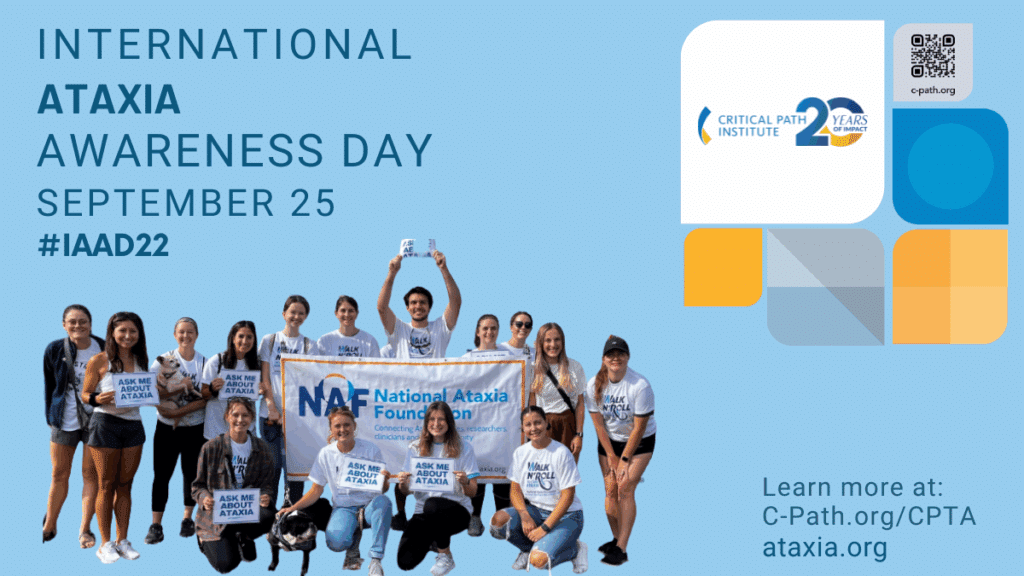
Every year on September 25, the global community comes together to recognize International Ataxia Awareness Day (IAAD). This important observance raises awareness of ataxia, a group of rare neurological disorders that affect coordination, balance, and speech. For the thousands of individuals and families worldwide impacted by inherited forms of ataxia, IAAD is both a moment of reflection and a call to action. It is a day to highlight the challenges, and to honor the strength of those living with the disease, and to accelerate progress in the development of more effective therapies for people with unmet medical needs.
Understanding Inherited Ataxia and Its Impact
Ataxia is not a single disease but a family of disorders that impair the brain’s ability to coordinate movement. Inherited ataxias, such as spinocerebellar ataxias (SCAs) and Friedreich’s ataxia (FA), result from genetic mutations passed through families.
Living with inherited ataxia means confronting progressive loss of independence. Everyday activities—such as climbing stairs, writing, or even speaking clearly—become increasingly challenging. Many living with conditions such as SCAs or FA eventually rely on mobility aids, and in severe cases, ataxia can shorten life expectancy. Despite these hardships, individuals with inherited ataxia and their families demonstrate remarkable resilience, advocating for better treatments and supporting one another through strong community networks.
C-Path’s Role: Critical Path to Therapeutics for the Ataxias
Critical Path Institute® (C-Path) recognizes that transforming the lives of people affected by rare diseases requires global collaboration, scientific innovation, and data-driven solutions. To this end, C-Path leads the Critical Path to Therapeutics for the Ataxias (CPTA) consortium to address SCAs, while the nonprofit’s Friedrich’s Ataxia Integrated Clinical Database (FA-ICD) works to standardize FA clinical trial data and natural history data. The CPTA initiative unites stakeholders across academia, industry, patient advocacy groups, and regulatory agencies to accelerate the development of new therapies for SCA, while FA-ICD is designed to catalyze and accelerate Friedreich’s ataxia (FA) research and drug development.
By building consensus around outcome measures, standardizing data collection, and enabling pre-competitive sharing of knowledge, CPTA helps reduce duplication of effort and promotes more efficient drug development. The result is a clearer path for potential treatments to move from discovery to clinical trials and, ultimately, to the people who need them most.
The Power of Data Sharing in Rare Disease Research
One of the greatest challenges in rare disease research is the limited number of patients available to participate in clinical studies. Inherited ataxias, including SCA and FA, affect relatively small populations, which makes gathering statistically meaningful data difficult. Without collaboration and data sharing, research can become fragmented and progress slowed.
Data sharing addresses this challenge by pooling information across studies and institutions. When researchers, companies, and patient organizations contribute to shared databases, the scientific community gains a more comprehensive understanding of the disease. This shared knowledge fuels the development of robust clinical trial designs, better biomarkers, and more effective endpoints—all essential components for successful therapeutic development.
“CPTA endeavors to identify consensus-based unmet medical needs and develop regulatory-grade solutions to accelerate and innovate SCA clinical trials,” said Terina Martinez, Executive Director of C-Path’s CPTA consortium. “This work is data-driven, and our integrated ataxia database represents the world’s largest publicly accessible SCA database, spanning over a half dozen different SCA types. We appreciate all who have participated in clinical research studies and shared their data and who are eager for it to translate into meaningful, innovative treatments. International Ataxia Awareness Day is a tangible reminder of the importance and urgency of our collaborative work and the international ataxia community that it serves.”
FA-ICD: Accelerating Friedreich’s Ataxia Research
Enter C-Path’s Friedreich’s Ataxia Integrated Clinical Database (FA-ICD), and the power of data sharing in action. C-Path and the Friedreich’s Ataxia Research Alliance (FARA) collaborate to provide the largest accessible database for FA. The FA-ICD, accessible through the RDCA-DAP platform brings together de-identified clinical data from multiple sources, creating a centralized and standardized resource for researchers worldwide. By harmonizing data that was once siloed, the FA-ICD allows scientists to ask new questions, validate findings across larger populations, and identify meaningful trends that would otherwise remain hidden.
For drug developers, the FA-ICD is an invaluable tool. It provides the evidence needed to design better clinical trials, reduce uncertainty, and support regulatory decision-making. For patients and families, it represents hope: the acceleration of therapy development and the promise of improved outcomes for those living with Friedreich’s ataxia. Access to the database by industry was critical in advancing the first drug approval for FA, and industry continues to actively leverage the database to inform clinical activities.
Looking Ahead with Purpose, Unity, and Action
International Ataxia Awareness Day is more than a date on the calendar—it is a reminder of the urgency of our shared mission and brings to light the work the C-Path ataxia teams do every day. Every step forward in research, every collaboration forged, and every piece of data shared brings us closer to transforming the lives of individuals and families affected by ataxia.
Through programs like CPTA and resources like the FA-ICD, C-Path is helping to pave the way for meaningful breakthroughs in all ataxias, including SCA and FA. The fight against ataxia is not easy, but together—with people living with Ataxias, advocates, scientists, and policymakers—we can turn awareness into action and action into lasting change.
On this IAAD, on a community-wide basis, let us reaffirm our commitment to advancing therapeutic development, championing data sharing, and delivering hope to the ataxia community worldwide.


